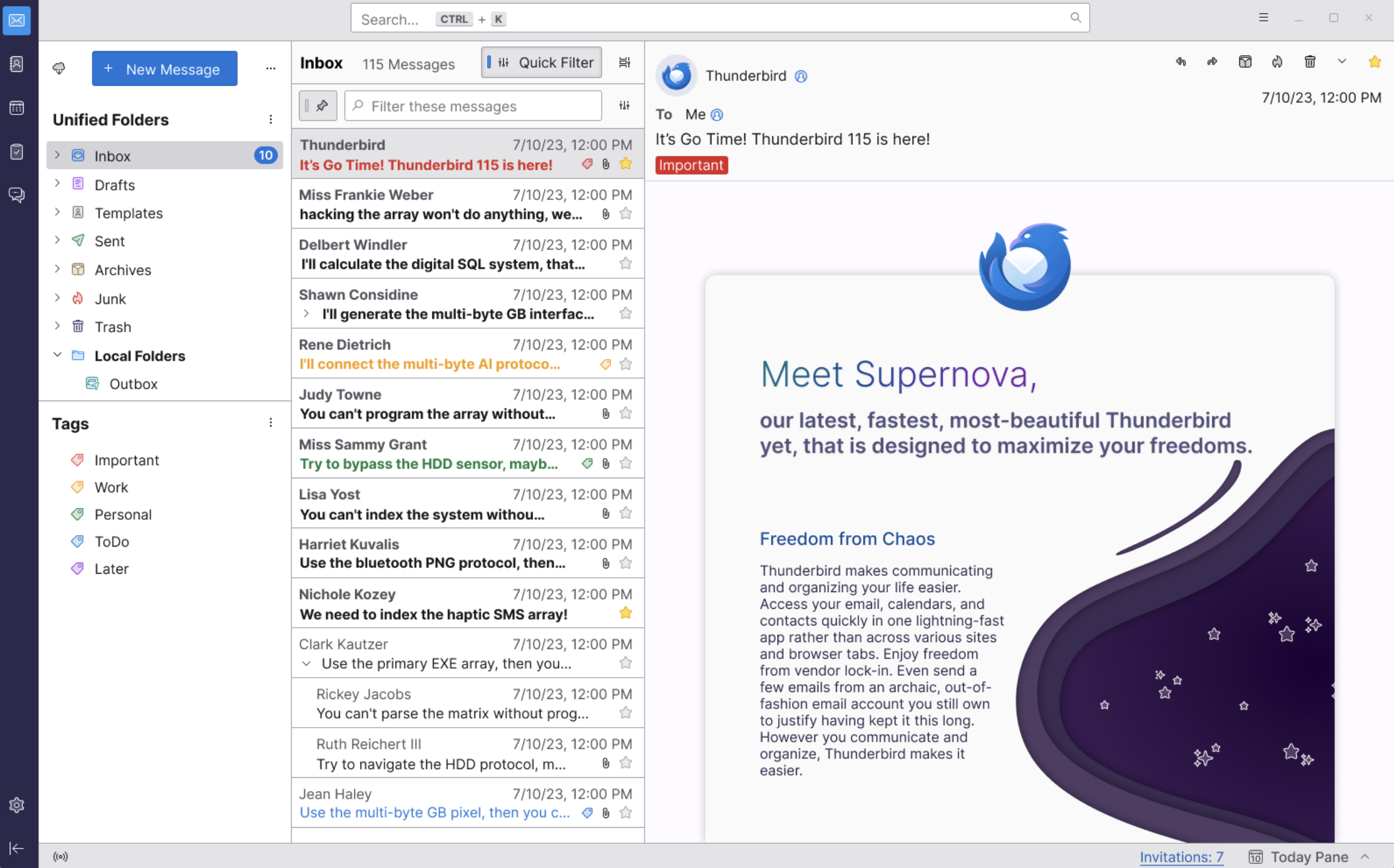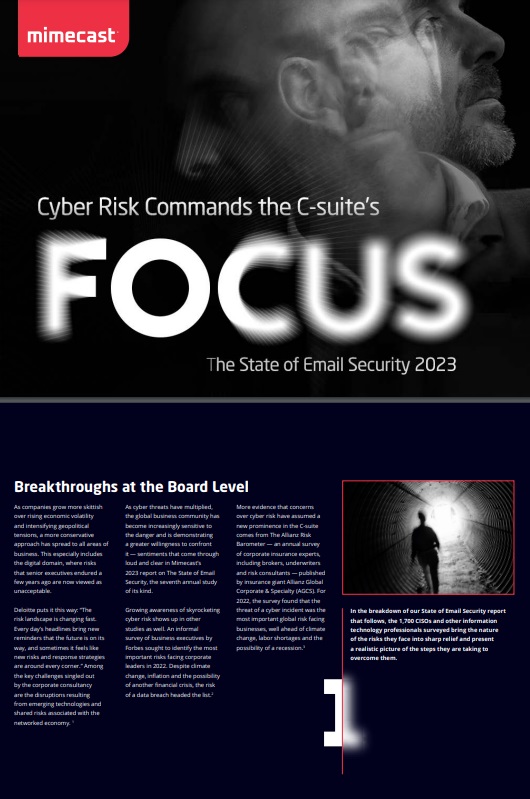Why Thunderbird Supernova could be a game-changer
Version 115 of the Mozilla Foundation’s email client is a godsend for users in need of a local repository of messages and documents

The internet is a merciless engine of progress, and I don’t always think that’s a good thing. Take the Mozilla Foundation. Turning out internet software tools since the early days, it is now, according to statistic addicts, almost consigned to history when it comes to market share for its famous Firefox browser.
But there’s also Thunderbird, a cross-platform email client application that’s actually usable. This has recently been reworked with version 115, codenamed Supernova, and its changes are worth some attention.
We live in an era of cloud-resident email accounts. Actually, if you want to be pedantic about it, that description is nonsense.
What's new in Thunderbird Version 115, AKA Supernova?

> Dynamic unified toolbar
> Much-improved visuals and icons
> Easier density control
> Intuitive app menu
> Sortable folder modes
> New tags view
> Modernized cards view
> Improved address book
> Expanded accessbility
> Improved calendar design
Cloud scales up and down as your demand for computing varies, driven by your business and your customers.
When did you last ring up Hotmail and say “deliver a bit faster”, or demand the right to migrate your online presence from one cloud hosting region to another? Not even Amazon’s (otherwise excellent) business email hosting service gives you one iota of the controllability that cloud hosters take for granted.
This cuts little ice with the type of user who throws ‘cloud’ around with abandon. The classic cloud-obsessed, intolerant user considers local expertise to be the kind of dinosaur they can do without, the moment they switch to the cloud. The problem for them is, thanks to COVID-19, we have all been through a global phenomenon that showed us exactly what happens when bureaucrats design a system using modern tools.
Investing in a solid local database
What does this have to do with Thunderbird? Very simply, it’s all about the uses and upkeep of a local database. Cloud systems assume there will always be a connection to the cloud, and that any database services are handled in a megascale, highly optimized fashion.
Get the ITPro daily newsletter
Sign up today and you will receive a free copy of our Future Focus 2025 report - the leading guidance on AI, cybersecurity and other IT challenges as per 700+ senior executives
RELATED RESOURCE

1,700 CISOs and IT professionals share how they are protecting their organizations from cyber attacks.
DOWNLOAD FOR FREE
What I found was that while pandemic systems (viral detection tests, vaccination records etc) were demanded locally, and held centrally, there was no plan B: if you were denied access, then even local copies of PDFs on Android phones wouldn’t open. Ironically, that’s because the bureaucrats used the PDF format to limit the lifetime of the certificates they graciously allowed me to download, and the lifetime, even opened locally, demanded a cloud connection to be checked and permitted.
All of the crises I’ve seen in the last few years have, as an apparent side effect, included loss of access to the cloud. Whether it’s queueing for the passport check at Calais Eurostar, or sitting in huge traffic snarl-ups in California, the sign that you are in real trouble is that your cloud-resident services go down.
READ MORE

These experiences have made me much more interested in being able to have a local, portable repository of messages and documents, which doesn’t depend on the cloud. Enter Thunderbird. I want to be able to show officials everything I need to satisfy their enquiries without necessarily having a trusted link.
I know that Thunderbird isn’t alone. In particular, Yahoo has relaunched and rethought its local email app. I particularly like its take on the process of handling attachments, although I haven’t done enough testing to report on whether this is an entirely local process.
But I do think the use of email has now expanded so much that the assumptions about cloud storage and “reasonable” data sizes have had to be almost completely discarded. One of my customers has a 17GB Outlook data file: so big, I can’t summon up the courage to do battle with it, at least not on his old workstation PC. Even equipped with all the utilities and knowledge on offer at Slipstick, I am wary of tangling with scattered, age-old lists of vital messages interspersed with the jagged remains of deleted junk emails.
Despite my several decades of VBA experience, the state of Outlook local data isn’t something I’m inclined to dabble in. There are far too many ifs, buts, ohs, and oughtas in the readme files to reassure me that I’m taking a safe and reversible course of action with what is often a business’s most important data repository.
Why Thunderbird Supernova is winning me over
Thunderbird has no such qualms. It will go through a compaction exercise on an email folder with a right-mouse click. Zap! All that space left by deleted messages is gone. This might be for bad reasons: maybe Mozilla finds modern laptop or tablet disk volumes too miserly for the safe storage of vital messages in larger quantities, or perhaps it’s just too difficult to break the Outlook hegemony. But at least it tried.
I now run an ancient but very lovable ThinkPad Tablet 2 with an LTE modem and Windows 10 as my email viewer and repository. Slightly fiddly with my pinky finger as scrolling and selection stylus, but far better than staring at various hula-hoops and beachballs while waiting for cloud access to reappear. Normally with a downright angry queue of holidaymakers behind me, at the airport or ferry terminal.
I expect to have two types of heckling at this news, neither of which I actually disagree with. The first is those who point out that we have been here before, with mail databases dating back to Microsoft Exchange, Lotus Notes and many more. I can remember a certain frisson of shock at discovering that IceWarp could be set up to use a SQL Server for email message storage. Yes, various efforts to use databases for emails have been tried for decades. But I can report that if you hit an email database with a quarter of a million messages then you can quite easily break it: these days, a quarter of a million messages would be one nuclear family’s mail archive.
Read more

The second heckle is that nobody uses email anymore! This is one of those things that seems to follow the sunspot cycle, with eras of low activity followed up by eras of massive outbursts of change. After all, wasn’t Slack meant to replace email? I believe that email has found a new role: not as the main or even the first means of communication, but rather as the repository of information. It’s the place where all those horrible “follow-up copies” get sent, along with legal notices: stuff you aren’t gagging to read, but which it’s handy to be able to look back on, once the dust settles and the camera live stream LEDs go dim.
This demands a well-designed, extremely robust, and recoverable database. Something I am pinning my hopes on Mozilla being able to deliver.
-
 Bigger salaries, more burnout: Is the CISO role in crisis?
Bigger salaries, more burnout: Is the CISO role in crisis?In-depth CISOs are more stressed than ever before – but why is this and what can be done?
By Kate O'Flaherty Published
-
 Cheap cyber crime kits can be bought on the dark web for less than $25
Cheap cyber crime kits can be bought on the dark web for less than $25News Research from NordVPN shows phishing kits are now widely available on the dark web and via messaging apps like Telegram, and are often selling for less than $25.
By Emma Woollacott Published
-
 How to choose the right storage medium for your organization’s backup strategy
How to choose the right storage medium for your organization’s backup strategyIn-depth Hard disks have been the go-to backup medium for decades, but are they heading for the scrap heap?
By David Howell Published
-
 Hybrid backup strategy for business
Hybrid backup strategy for businessIn-depth Flexible working is here to stay, and backing up has never been more important
By Dave Mitchell Last updated
-
 How to pick the best NAS for your small business
How to pick the best NAS for your small businessTutorials NAS appliances can help you grow your business - here's what you should look for
By Dave Mitchell Last updated
-
 How to choose a 2U rack server
How to choose a 2U rack serverIn-depth Don’t put up with old, energy-chewing, space-hungry servers
By Dave Mitchell Last updated
-
 Configuring servers: Four steps to a successful setup
Configuring servers: Four steps to a successful setupIn-depth Bear these essential points in mind when building or upgrading your infrastructure
By Dave Mitchell Last updated
-
 Why – and how – should I switch my business to virtual servers?
Why – and how – should I switch my business to virtual servers?In-depth With servers increasingly sold as a service, rather than a piece of on-site hardware, is it time to shift?
By Dave Mitchell Last updated
-
 MWC 2014 news & reviews roundup: Everything you need to know
MWC 2014 news & reviews roundup: Everything you need to knowIn-depth As MWC 2014 draws to a close, we take a look back over the big announcements from Samsung, Nokia, Mozilla and others...
By Kyle Nazario Published
-
 Week in Review: Nokia updates Symbian, browser wars kick off
Week in Review: Nokia updates Symbian, browser wars kick offNews This week, Symbian gets Nokia's attention whilst the browser giants are at it again.
By Jennifer Scott Published